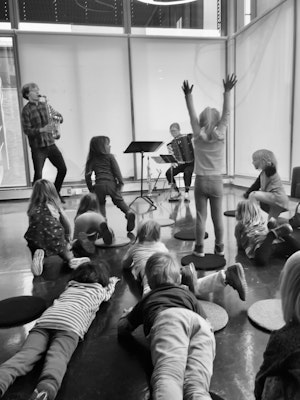CEMPE aimed to develop knowledge about the transition from being a student at a higher music education institution to playing an active role in the global music community and labour market of the future.
-> Watch EXCEMPEL Webinar on Tomorrow's Musicians
-> Hear the episode on Tomorrow's musicians on Konservatoriumspodden (in Norwegian)
The music industry is changing rapidly. A large number of today’s students will have portfolio careers upon graduation, and the curriculum of our study programmes needs to adapt to this shift. The area has become increasingly important in the European field of higher music education during CEMPE’s period, as illustrated by the titles of the past and current AEC projects called Strengthening Music in Society (2018-2021) and Empowering Artists as Makers in Society (2022-2025).
Artistic entrepreneurship?
What entrepreneurial skills and knowledge mean in higher music education has led to debate and engagement by musicians, staff and students. For CEMPE, it has been important to explore how to combine the learning of entrepreneurial skills with the musical and artistic core of the studies, centering on developing strong artistic competencies and ideas. There have been several seminars and events addressing these topics in diverse ways throughout the CEMPE period, sometimes also in collaboration with external partners such as BI and UiO.
A milestone was the international conference The protean musician in 2017, which was arranged jointly by the research centres at NMH. At this conference, the traditional notions about success in higher music education were questioned. Interestingly, "What is success” was the big question also for the first Music Student Conference in Norway in 2020, where students themselves set the agenda and invited keynote speakers and an alumni panel to share their views on this crucial question. Towards the end of the centre period, the final conference of CEMPE in November 2023 was dedicated to finding paths forward for higher music education. The conference was introduced by keynote speaker Helena Gaunt, followed by an NMH Talk on how higher music education can support students to become makers of flourishing musical practices for the future.
These are all examples of how CEMPE’s work has contributed to strengthening the discussions inside the institution, as well as on a national and international level, on what a forward-looking music performance education should look like today. Through our efforts, we have aimed to activate stakeholders to exchange views and ideas and facilitate development processes within more collective and open spaces.
Curriculum development
In the first centre period, CEMPE engaged in curriculum development aimed at strengthening the study programmes’ relevance and connections with the music industry and society. A central outcome at NMH within this area was the establishment of the mandatory course Industry, Profession, Identity (Bransje, Profesjon og Identitet) for bachelor students in their fourth year. The course development was led by post.doc in CEMPE at the time, Tanja Orning. In this course, students are provided with both knowledge and practical skills needed in working life. The student-led jazz festival Serendip started as part of the curriculum revision of the Master of Music Performance programme. To lead a festival proved to be a valuable and relevant experience for students, contributing to developing skills and knowledge about leading, programming, administrating and making a music festival come to life. The Serendip festival has for many years been an integrated part of the curriculum for jazz students. This has further inspired other milieus at NMH to make yearly student-led festivals, such as the folk music students’ Ljøsblått or the classical chamber music festival Coffee Schmoffee.
Professional practicum
Professional practicum has been one of the focuses of the centre; looking at practicum arenas and developing formats and structures for connecting with the professional environment. Through this enhanced focus by CEMPE at NMH, many students have had important work-life experiences. For instance, at The Kulturtrøkk festival week in Hammerfest, students had an intense week of societal engagement and performances in a local community in the north of Norway. As well as providing students with unique practicum experiences, the people living in Hammerfest and the music community also benefitted from this project through the creative workshops, concerts, and fruitful collaborations that happened during the week.
Several international collaborations and networks on this topic have been conducted, one of them being a collaboration with researchers at the Royal Northern College of Music in Manchester on the WILMA project (Work-Integrated Learning in the Music Academy). WILMA was a large study examining professional placements in European higher music performance education, providing new knowledge on practicum in European countries’ higher music education institutions.
Student-led innovations
Many of the student-led projects funded by CEMPE centred on creating projects and arenas of value for society and the education. One of the greatest examples of this was the Child Concert Series, started by Susanne Trinh and Johanna Orellana, who wanted concerts for children to be valued more inside the institution. They wanted the quality of music for children to be higher in addition to offer musical experiences to children in the more disadvantaged areas of the city. Another example was the student-led project «Jobbskygging» (Work Shadowing), where students shadowed a musician of their own choice in their daily work. Participating students gained a greater understanding of what is required from a professional, and they reported that it led to useful reflections on future possible job scenarios. The alumni who were shadowed as mentors reported on fruitful reflections in their meetings with the students.
